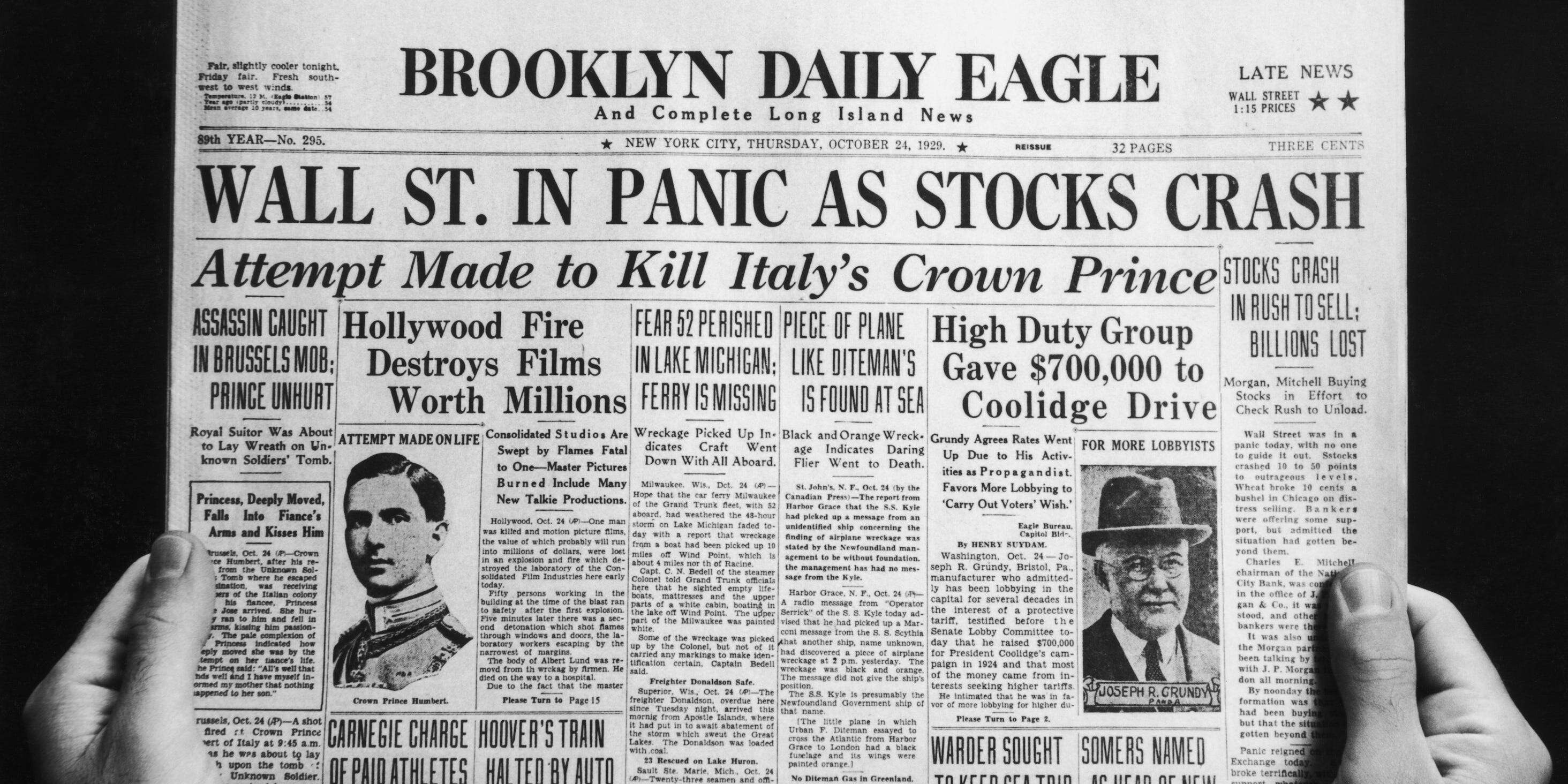Viral News | Explore around Viral and popular News this year
The Stock Market Crash: Causes, Consequences, And Lessons Learned For Investors
The Stock Market Crash: Causes, Consequences, And Lessons Learned For Investors have devastating impact on the economy and investors. The stock market crash of 1929, the most disastrous stock market crash in the history of the United States, caused a drop of over 12% in the Dow Jones Industrial Average and led to the Great Depression.
Editor's Notes: "The Stock Market Crash: Causes, Consequences, And Lessons Learned For Investors" have published today date". The Stock Market Crash: Causes, Consequences, And Lessons Learned For Investors is an important topic to understand because it can help investors avoid making the same mistakes that were made in the past. By understanding the causes and consequences of the stock market crash, investors can make more informed decisions about their investments.
We've done some analysis, digging information, made The Stock Market Crash: Causes, Consequences, And Lessons Learned For Investors we put together this The Stock Market Crash: Causes, Consequences, And Lessons Learned For Investors guide to help target audience make the right decision.

What Is a Stock Market Crash? Causes, Examples & Lessons Learned - Source www.thestreet.com
The following are some of the key differences between the stock market crash of 1929 and the more recent stock market crashes:
| Crash of 1929 | Recent Crashes |
|---|---|
| Caused by a combination of factors, including speculation, overvaluation, and a lack of regulation. | Caused by a variety of factors, including the collapse of the housing market, the subprime mortgage crisis, and the failure of several large financial institutions. |
| Led to the Great Depression, which lasted for over a decade. | Led to a recession, which lasted for several years. |
| Had a significant impact on the global economy. | Had a significant impact on the U.S. economy. |
The following are some of the lessons that investors can learn from the stock market crash of 1929:
- Invest for the long term. The stock market is volatile, and there will be ups and downs. However, over the long term, the stock market has always trended upwards.
- Don't put all your eggs in one basket. Diversify your investments across different asset classes, such as stocks, bonds, and real estate.
- Don't panic sell. When the stock market crashes, it's important to stay calm and not sell your investments in a panic.
- Be aware of the risks. Before you invest in any security, be sure to understand the risks involved.
FAQ
This FAQ section provides comprehensive answers to common questions and misconceptions surrounding the stock market crash.
Question 1: What are the primary causes of stock market crashes?
Answer: Crashes are often triggered by a combination of factors such as economic recessions, financial crises, geopolitical uncertainties, or market bubbles driven by excessive speculation.
Question 2: What are the severe consequences of a stock market crash?
Answer: Crashes can lead to widespread losses in investment portfolios, decreased consumer confidence, reduced corporate profits, and a slowdown in economic growth.
Question 3: Can stock market crashes be entirely prevented?
Answer: Crashes are inherent to the cyclical nature of markets, but implementing prudent regulations, fostering transparency, and promoting financial literacy can mitigate their impact.
Question 4: How can investors prepare for and navigate a stock market crash?
Answer: Strategies include diversifying investments, maintaining a long-term perspective, and not making impulsive decisions based on market volatility.
Question 5: What are some historical examples of significant stock market crashes?
Answer: Notable crashes include the Wall Street Crash of 1929, the Black Monday Crash of 1987, and the Financial Crisis of 2008.
Question 6: What lessons have investors learned from past stock market crashes?
Answer: Crashes have highlighted the importance of risk management, long-term investing, and the potential dangers of excessive leverage.
In conclusion, understanding the causes, consequences, and lessons learned from stock market crashes is crucial for informed investment decisions and navigating the inherent risks associated with financial markets.
Proceed to the next article section for further insights into stock market crashes.
Tips
Investors can glean valuable lessons from the stock market crash to protect and grow their wealth. Understanding the causes, consequences, and lessons learned The Stock Market Crash: Causes, Consequences, And Lessons Learned For Investors will empower investors to make informed decisions and navigate future market volatility.
Tip 1: Diversify Your Investments
Diversify your portfolio across different asset classes, such as stocks, bonds, real estate, and commodities. This strategy reduces risk by mitigating the impact of downturns in any specific sector.
Tip 2: Invest for the Long Term
Market fluctuations are inherent, and panic selling during downturns can lead to substantial losses. Invest with a long-term perspective, allowing time for markets to recover.
Tip 3: Maintain a Healthy Emergency Fund
An adequate emergency fund provides a financial cushion during unexpected events, including market crashes. Aim to have at least three to six months' worth of living expenses in a readily accessible account.
Tip 4: Seek Professional Advice
Consider seeking guidance from a qualified financial advisor to tailor an investment strategy that aligns with your financial goals and risk tolerance.
Tip 5: Stay Informed
Monitor financial news and economic indicators to stay abreast of market trends and potential risks. Knowledge empowers investors to make informed decisions and adjust their strategies accordingly.
Summary
By incorporating these tips, investors can navigate market volatility more effectively, protect their assets, and achieve long-term financial success.
The Stock Market Crash: Causes, Consequences, And Lessons Learned For Investors
The stock market crash of 1929 remains one of the most significant events in financial history. Its causes and consequences have been the subject of much debate, and it continues to offer valuable lessons for investors today. Six key aspects to consider include:
- Speculation: Excessive buying and selling drove prices to unsustainable levels.
- Margin buying: Investors borrowed heavily to buy stocks, amplifying the crash's impact.
- Weak regulation: Lack of oversight allowed for unethical practices and inflated valuations.
- Economic downturn: A slowing economy and falling consumer confidence contributed to the market's decline.
- Panic selling: As prices fell, investors rushed to sell, exacerbating the situation.
- Investor psychology: Fear and greed played a significant role in the crash and its aftermath.
These aspects are interconnected and underscore the importance of understanding the systemic risks associated with financial markets. They provide valuable lessons for investors, including the dangers of speculation, the need for proper regulation, and the psychological factors that influence investment decisions. By studying the causes, consequences, and lessons of the stock market crash, investors can increase their financial literacy and make informed decisions to mitigate the risks and maximize their returns.

Stock Market Crash Update - Source www.rockhouseagencyre.com
The Stock Market Crash: Causes, Consequences, And Lessons Learned For Investors
The stock market crash of 1929 was a watershed moment in American history. It triggered the Great Depression, which lasted for a decade and had a devastating impact on the global economy. The causes of the crash are complex, but they include:

What is a stock market crash? Understanding its causes and consequences - Source www.businessinsider.in
- Overspeculation in the stock market
- Weak regulation of the financial industry
- A lack of investor confidence
The consequences of the crash were also far-reaching. They included:
- The loss of millions of dollars in wealth
- The collapse of thousands of businesses
- Mass unemployment
The stock market crash of 1929 is a cautionary tale about the dangers of greed and speculation. It is a reminder that the stock market is not a get-rich-quick scheme and that investors should always do their research before making any investment decisions.
In the years since the crash, the financial industry has been heavily regulated to prevent another such disaster. However, the lessons learned from the crash are still relevant today. Investors should always be aware of the risks involved in investing and should never put more money into the stock market than they can afford to lose.
Conclusion
The stock market crash of 1929 was a devastating event that had a profound impact on the global economy. The causes of the crash are complex, but they include overspeculation, weak regulation, and a lack of investor confidence.
The consequences of the crash were also far-reaching. They included the loss of millions of dollars in wealth, the collapse of thousands of businesses, and mass unemployment. The stock market crash of 1929 is a cautionary tale about the dangers of greed and speculation. It is a reminder that the stock market is not a get-rich-quick scheme and that investors should always do their research before making any investment decisions.